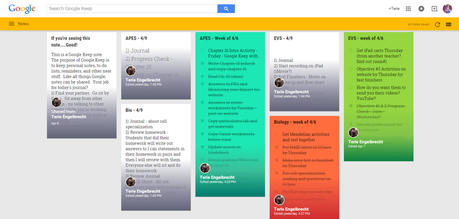But then I met Google Keep, Google's online note-taking tool.
 Actually, I had met Google Keep before. When it was first released I checked it out but, being the heavy Evernote user that I am, I realized that it didn't have the features to which I was accustomed to using in Evernote. After toying with it for a few minutes, I quickly navigated away, never to think of it again until I was putting together an advanced Google training for my current school district. I wanted to introduce them to more cool Google tools that would assimilate them further into the cult known as Google, and I thought Google Keep might be something they might want to try to use professionally.
Actually, I had met Google Keep before. When it was first released I checked it out but, being the heavy Evernote user that I am, I realized that it didn't have the features to which I was accustomed to using in Evernote. After toying with it for a few minutes, I quickly navigated away, never to think of it again until I was putting together an advanced Google training for my current school district. I wanted to introduce them to more cool Google tools that would assimilate them further into the cult known as Google, and I thought Google Keep might be something they might want to try to use professionally.I'm glad I had that thought, because it made me explore Google Keep a little bit further and really push all the buttons and kick the tires.
In Google Keep, there are really two basic types of notes - your regular average old note, and a list where you can check off what you've done as you accomplish each task. It's the list notes that sucked me into the Google Keep web. When I was lesson planing this weekend, I created a list note for each of my classes as I made my plans, writing down everything that needed to be done during the week to get my plans done. All this week I kept Google Keep open in a tab, and checked to see what I had to do each day, checking things off as I went. I also created a regular note for each of my classes with the agenda for the day, changing it up before I leave my classroom every day.
I have never felt more productive than I have this week. No losing paper notes, no "OMG I forgot to do _______." I'm going to try out their reminders feature next week to remind me of the more critical tasks that need to be accomplished; maybe this will push me over the edge into super-productivity.
But what about students? me being me, I just couldn't keep this handy little tool all to myself. I had to to let students know it existed and give them a taste of Google Keep goodness. I did this first in my Environmental Science classes, where we are currently making Common Craft-style videos regarding different types of air pollutants. They first had to outline their videos, which I had them do in Google Keep. While that's pretty cool in and of itself, I also had them share the note in which they put their outline with their partner (this is Google after all...sharing is caring and you can share just about anything Google), and then both people could create the video outline together. I also had them share their note outline with me so I could see it as they worked on it and give verbal feedback along the way. Right now you can only share notes with specific individuals, but I'm hoping they make the sharing as robust as they do with their suite of Google Drive apps.
I'm also planning on introducing Keep to my AP students. I thought this would be a fantastic tool to help them summarize, question, and make their own meaning after reading a chapter or a Scientific American article. More on that later.
I'm glad I gave Google Keep a second look. Again, it's not as fully developed as Evernote or Wunderlist, but I think it is definitely an option for anyone looking for a note-taking/keeping tool without too many frills. I also think it's a wonderful tool to introduce to students to get them to start using technology for productivity, especially if your school is a GAFE school. Any other thoughts on Google Keep or online note-taking tools? Please feel free to fire away in the comments.
